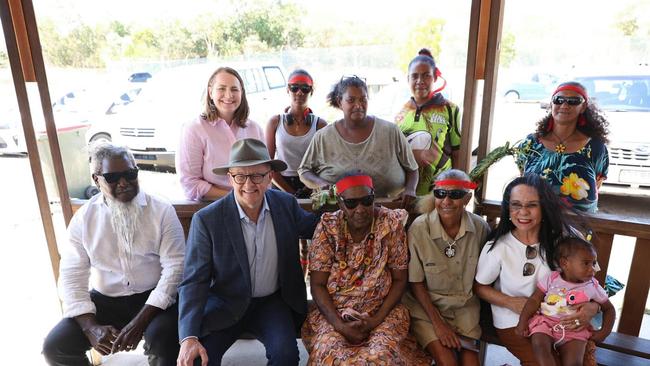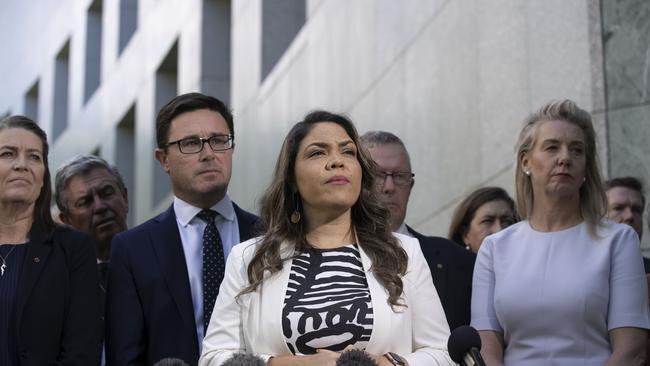
We know that because government officials admitted during Senate estimates hearings early last month that Anthony Albanese did not get legal advice from the Attorney-General’s Department before putting forward the language of his proposed amendment at the Garma Festival in July.
That lack of due diligence is especially striking given the remarkable potential reach of the voice suggested in the recent Federal Court decision in Santos v Tipakalippa. This case, which has sent shivers down the spines of those who want to build offshore energy projects, including wind farms, concerns a statutory right of consultation.
It affirms that statutory rights of consultation are wide-reaching and impose heavy obligations to offer ample time, resources and information to those with rights to be consulted, and a duty to engage meaningfully with any concerns arising from the consultation.
The decision is a warning and a reproach. It warns us that if you think a statutory consultation right imposes heavy burdens and chills commerce, a constitutional right is all that but on steroids.

Even worse, while statutory consultation rights can at least be amended by parliament if they get out of control or become inappropriate or ineffective, a constitutional consultation right is beyond parliament’s reach.
The scope of the constitutional consultation right offered by the Albanese amendment will be settled, as former High Court justice Kenneth Hayne recently confirmed, solely by the High Court.
The Tipakalippa decision is a stern rebuke of the gross negligence not merely of a government that offered a constitutional amendment without asking its own lawyers what the implications would be but of all those corporate do-gooders who advocate for a constitutionally entrenched voice without any apparent understanding of its implications for their own activities.
Before explaining what the Tipakalippa case says and why it is significant, it is worth repeating the proposed Albanese amendment. The first two sentences say, “There shall be a body, to be called the Aboriginal and Torres Strait Islander voice. The Aboriginal and Torres Strait Islander voice may make representations to parliament and the executive government on matters relating to Aboriginal and Torres Strait Islander peoples.”
These are the operative two sentences of the proposed amendment. The third sentence is a machinery sentence giving parliament power to make laws implementing the voice. Importantly, this third sentence is expressed to be subject to the first two sentences and the rest of the Constitution.
This means that no laws passed by parliament under the third sentence can limit, restrict or conflict in any way with the powers, features or functions of the voice that the High Court finds are expressly described in, or necessarily implied by, the first two sentences.
While the vast bulk of commentary about the voice has concerned its power to make representations to parliament about proposed laws, today we need to concentrate on the much-overlooked but in many ways more significant power of the voice to make representations to the executive government.
The addition of the words “and the executive government” to the Albanese amendment has horrified administrative lawyers because while it was always very dubious that the powers of the voice to make representations to parliament were non-justiciable (and former justice Hayne has now removed any lingering credibility that argument had), it never had any merit at all in relation to actions of executive government.
Judicial review of the actions of executive government is a powerful, central and unchallengeable role of the courts. Therefore, the courts will undoubtedly have power to second-guess the exercise of the voice’s proposed constitutional right of consultation about acts or omissions of the executive government.
The Tipakalippa case is a pointer to how courts will exercise their right to review that constitutional consultation right.
Dennis Tipakalippa is an elder, a senior law man and a traditional owner of the Munupi clan from the Tiwi Islands. Santos had been granted a licence to drill wells in an offshore area about 140km offshore from the Tiwi Islands. It had to produce to the National Offshore Petroleum Safety and Environmental Management Authority a drilling environmental plan that demonstrated adequate compliance with (among other things) the consultation rights conferred by the Offshore Petroleum and Greenhouse Gas Storage (Environment) Regulations. Under the regulations, Santos had to show adequate consultation with persons whose “functions, interests or activities” would be affected by the proposed plan.
While Santos had consulted with the Tiwi Land Council, the court held that it should have consulted directly with Tipakalippa because he possessed a sufficient interest of a spiritual or cultural kind to be consulted.

Critically, paragraph 56 of the Federal Court’s judgment points out that Santos should have provided “sufficient information to allow the affected … individuals to make an informed assessment of the possible consequences of the proposed activity on their … interests”.
The court also pointed out the regulations intended “that the consultation be genuine, in that the affected individuals are required to be given a reasonable period for the consultation … and to respond to Santos with their concerns”.
The voice must be given those adequate consultation rights about any individual act or omission of executive government that “relates to” Aboriginal people. It must be given those consultation rights sufficiently in advance of the relevant act of executive government to enable it to consider the matter properly. No doubt the voice will have to be given the budget and resources to exercise its rights meaningfully.
Given that the more opaque constitutional right to consultation will not necessarily be met by meeting more precisely defined statutory rights consultation, the voice will add another layer of potential lawfare to any offshore energy projects, including wind farms.
Enough, then, of the gross negligence and simple reliance on the vibe. Both government and business must do some careful due diligence on the practical implications of the Albanese amendment.
If there are to be consultation rights, so be it – but clearly define them in legislation. Not in the Constitution.








It is safe to say no government has ever proposed an amendment to our Constitution with as little care and diligence about its exact practical effect as the proposed Albanese amendment to establish the Indigenous voice.